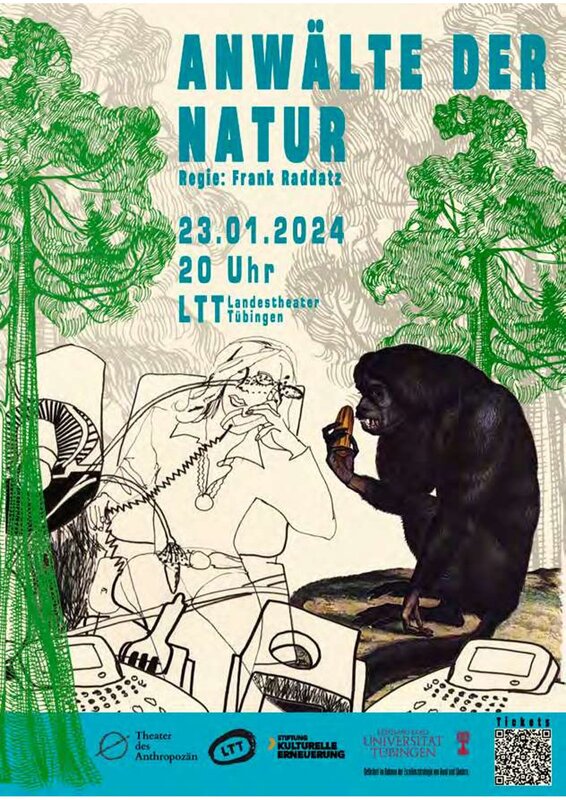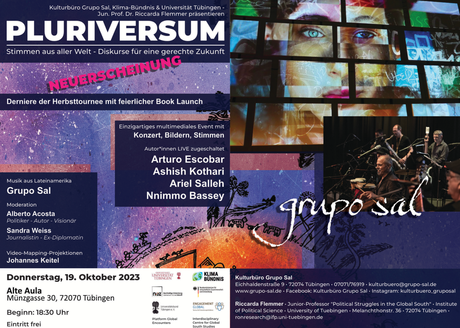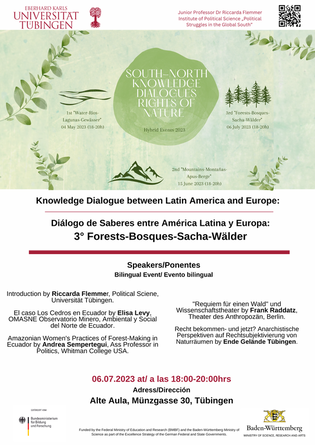Performance Art and Science Lecture in and with the Forest
20 and 21 July in Kirnbachtal Schönbuch
|
The lecture and the dance performance (traces) invite you to the forest Schönbuch to experience different perspectives on human-nature relations.
Artist Jakob Jautz will show traces, a land art, dance and circus performance in and with a forest. It guides you along interactive, installatory, and performative stations through a landscape of wonder. Junior Professor Dr Riccarda Flemmer, Institute of Political Science, University of Tübingen, will share insights into the global Rights of Nature movement, a leading agent to resist extractive industries and to politically change our planetary socio-ecological relations. Registration: [email protected] Price: donation based Location: Kirnbachtal Schönbuch (directions on how to get to the meeting point will be sent by e-mail after registration) When: Sat, 20 July 2024, 12 - approx. 2 pm in German and 6 - approx. 8 pm in English Sun, 21 July 2024, 12 - approx. 2 pm in English and 6 - approx. 8 pm in German |
Cine Latino - Reading and Panel Discussion
04 May at Liquid - Kelter Tübingen
|
1:00 p.m. READING: NATURE HAS RIGHTS (with the author Elisabeth Weydt)
When animals, forests and rivers go to court - for a radical rethink in the coexistence of humans and nature. We are on the brink of ecological collapse and time to change direction is running out. Paradoxically, a helpful remedy here could be a very protracted one: Changing our legal systems and worldviews: declaring nature a legal subject. Ecuador is the first and so far only country to have enshrined this idea in its constitution. Accordingly, nature is not only worth protecting here because it serves mankind, but simply because it exists. Taken to its logical conclusion, this idea can turn everything around: Our economy, our transport, our lives. Many initiatives around the world are working on its realisation, including in Germany. Journalist Elisabeth Weydt has been researching raw material extraction and land rights in Ecuador and other countries. In impressive stories, analyses, and portraits, she reports on the people who are translating this idea into reality and on the web of economic entanglements that make this difficult. 5:30 p.m. PANEL DISCUSSION: PEOPLE AND MOUNTAINS IN HARMONY? - CHANGE IN THE ANDEAN ALTIPLANO Panel discussion on the thematic focus with Leonardo Barbuy La Torre (director), Rodrigo Otero Heraud (director), Alberto Acosta (Ecuadorian economist, politician), Fernando Dias Costa (musician) and Elisabeth Weydt (journalist, freelance reporter and author). Moderated by Riccarda Flemmer (Junior Professor of Political Science). |
Lecture by Prof Dr Riccarda Flemmer & Dr Matthias Kramm: "Why nature should have rights"
Wednesday, 24 January at 7 p.m. - 8:30 p.m. Online and at Münchner Zukunftssalon
FREE OF CHARGE
Nature is increasingly being granted its own rights. In this way, endangered forests, rivers, or lakes are to be better protected against harmful environmental impacts caused by humans. The proposal dates back to the early 1970s but was only implemented in 2008 when Mother Nature ("Pacha Mama") was granted her own rights as part of a constitutional amendment in Ecuador.
In the meantime, other Latin American countries, as well as New Zealand and the USA, have introduced such rights for certain ecosystems. Indigenous movements and philosophies have often played a decisive role in this. In 2022, Spain became the first European country to follow suit and recognise the Mar Menor saltwater lagoon as a legal entity.
The lecture shows how the idea of the Rights of Nature came about, how it has gained momentum over the last 15 years and how it can help us to better protect nature and endangered ecosystems in the future. The two speakers will be travelling through various countries and continents and presenting specific applications and initiatives.
Riccarda Flemmer is a junior professor at the University of Tübingen and a political scientist specialising in political movements for the Rights of Nature in the Global South and North.
Matthias Kramm is a political philosopher and researches the Rights of Nature in Mexico at the Universidad Nacional Autónoma de México and Wageningen University in the Netherlands.
Nature is increasingly being granted its own rights. In this way, endangered forests, rivers, or lakes are to be better protected against harmful environmental impacts caused by humans. The proposal dates back to the early 1970s but was only implemented in 2008 when Mother Nature ("Pacha Mama") was granted her own rights as part of a constitutional amendment in Ecuador.
In the meantime, other Latin American countries, as well as New Zealand and the USA, have introduced such rights for certain ecosystems. Indigenous movements and philosophies have often played a decisive role in this. In 2022, Spain became the first European country to follow suit and recognise the Mar Menor saltwater lagoon as a legal entity.
The lecture shows how the idea of the Rights of Nature came about, how it has gained momentum over the last 15 years and how it can help us to better protect nature and endangered ecosystems in the future. The two speakers will be travelling through various countries and continents and presenting specific applications and initiatives.
Riccarda Flemmer is a junior professor at the University of Tübingen and a political scientist specialising in political movements for the Rights of Nature in the Global South and North.
Matthias Kramm is a political philosopher and researches the Rights of Nature in Mexico at the Universidad Nacional Autónoma de México and Wageningen University in the Netherlands.
"Lawyers of nature" The rights of nature as a theater performance
Tuesday, January 23 at 20 p.m. at LTT - in cooperation with the University of Tübingen
|
Do trees have rights? - When Christopher D. Stone posed this question 50 years ago, it sounded almost naive, or at least innocent. But in view of the current ecological threats, the rights of nature could prove to be a decisive lever for putting a stop to disastrous developments such as the climate crisis and the extinction of species. For this reason, more and more states are declaring individual actors of nature to be legal subjects. In 2022, for example, the Rivière Magpie in Canada and the Mar Menor saltwater lagoon in Spain were granted the status of legal entities. Are we at the beginning of a huge cultural transformation movement?
In Lawyers of Nature, conférencieuse Carrie Getman de Agudo, accompanied by music legend Kevin Mooney, embarks on a tour d'horizon to examine the changing relationship between nature and law. The planned visit soon develops into a wild journey that leads not only into the past and present but also into the future. With the traditional concept of an object-like nature, the historical continuum that leads from the dark zones of the mythical ages into the light-flooded world of omniscient rationality also collapses. Frank Raddatz: writer, director and artistic director of the Theatre of the Anthropocene, which is based on Humboldt's idea that only an intact bond between man and nature, woven from knowledge and experience, empathy and emotion, can form the basis of a sustainable civilization. In cooperation with the University of Tübingen, Riccarda Flemmer Professorship "Political Struggles in the Global South" and funded as part of the Excellence Strategy of the German federal and state governments. Get your tickets here! Admission price: 12 euros, reduced 7 euros |
PLURIVERSUM - Voices from around the world - discourses for a just future
Thursday, 19 October 2023 at 6:30 p.m. in Alte Aula (Münzgasse 30, Tübingen)
|
Come and listen to exciting impulses by the editors Arturo Escobar, Ashish Kothari, Ariel Salleh, Federico Demaria as well as the winner of the Alternative Nobel Prize Nnimmo Bassey, with moderation by Alberto Acosta and Sandra Weiss, passionate music by Grupo Sal, and video projection art by Johannes Keitel!
The final and highlight of the fall tour will be the release of the German language edition of "PLURIVERSUM - An Encyclopedia of Good Living". The multimedia event will take place in German and English on 19 October 2023 at 6:30 p.m. in Alte Aula (Münzgasse 30, 72072 Tübingen). Admission is free and everyone is very welcome! Download the event flyer here. |
Knowledge Dialogues on Rights of Nature: 3° Forests-Bosques-Sacha-Wälder
Thursday, 6 July 2023 at 18h in Alte Aula (Münzgasse 30, Tübingen)
|
Have you ever wondered...
What rights would forests need? How do we know that a forest is "doing well"? What actually is a forest? What would (have to) change in our conception and treatment of forests, if forests were recognized as legal entities and could sue? Which human representatives should be allowed to speak for a forest and which should not? These are some of the questions we will speak about:
For online participation, please register here/ Para participar en línea regístrate aquí: https://www.eventbrite.de/e/667695574437 |




